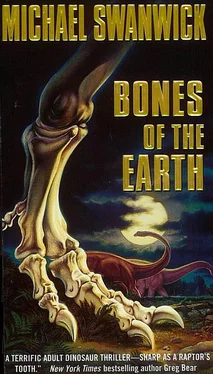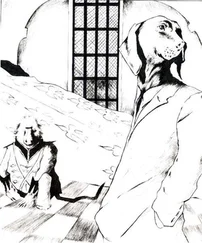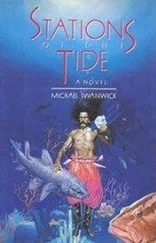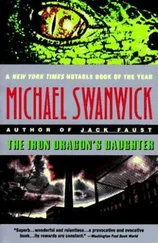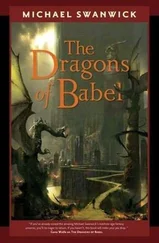Griffin, unfortunately, was a battler. It took three hours’ repetitive argument for him to give in.
“Can anything at all be resolved through you?” he finally asked. “Have you the authority to make decisions without precedent? Can you, under any conditions, send us forward on your own cognizance?”
“No.”
Griffin looked disgusted. “Then leave.”
It turned to go. Suddenly, Molly remembered another of Salley’s hints. “Tell me something,” she said. “Exactly how many of you are there?”
It paused. “One.”
“No, not you personally. I mean of the Unchanging. How many Unchanging are there in Terminal City? How many are there in the world at any given time? How many exist if you add up every one of the Unchanging no matter what era in time it inhabits?”
“One,” it said. “I am all there is. I perform all tasks, fulfill all functions, suffice for all that must be done. Only me. One.”
* * *
When the Unchanging was gone, Molly Gerhard said, “Yikes.”
“What annoys me,” Griffin said, “is the very real possibility that the Pentagon has had this information all along, but didn’t deem it important that we share in it.”
Jimmy scratched his head. “Let me get this straight. There’s only one of them.”
“Yes. One single individual, looped through time a thousand, a million, however many times it takes to do all the tasks that need doing.”
“Like that old notion that there was only one single subatomic particle running from one end of time to the other and back, over and over, until it’s woven an entire universe out of itself?”
“Yes.”
Jimmy stood, scraping his chair back on the floor. “Then I know what to do. Gather up everything you want to take with you. We’re leaving.”
* * *
When they came to the center of Terminal City and saw the guard waiting for them, Griffin said mildly, “I hope that whatever you plan doesn’t require our getting past the Unchanging. Without my pass, we won’t be allowed anywhere near the funnel.”
Molly Gerhard felt a sudden chill. Without access to the funnel, they had no way go get home. “Ever?” she asked.
“Now don’t you worry one least bit,” Jimmy said. “Let me show you how we handle problems like this back in Belfast.”
Unhurriedly, but not slowly either, he walked up to the Unchanging on duty before the cavern’s entrance. “Excuse me just a sec,” he said. “I have something here that—”
He was alongside the Unchanging now. His hand came out of his pocket and moved with uncanny speed toward the being’s back. Then he stepped away.
There was surprisingly little blood. Just a spreading crimson stain on the robe where the knife hilt stuck out of the Unchanging’s back.
Quietly, without protest, it fell.
It was quite dead.
“If there’s only one of him, then he has to end somewhere,” Jimmy commented. “And if he ends here, then he couldn’t see it coming.”
He started toward the funnel. “Come on.”
Lost Expedition Foothills: Mesozoic era. Cretaceous period. Senonian epoch. Maastrichtian age. 65 My B.C.E.
When sunset came, they set up the poptent in a sheltered spot in a grove of sycamores and fell asleep almost immediately.
In the morning, Chuck was the first out, whistling cheerily. The instant he left the tent, however, the whistling cut off.
He stuck his head back in and, with quiet urgency, said, “Don’t make any fast movements or loud noises. Grab your things and get out of the tent. Now.”
“I hope this isn’t another one of your—” Tamara began, crawling out, spear in hand and blouse only half buttoned. “Oh, shit.”
A herd of geistosaurs had moved into the grove. It was hard to count their numbers in the dawn light, but there were at least forty of them. They were unhurriedly stripping the leaves from the lower branches of the sycamores.
The geistosaurs were almost dead white, with blotchy black markings scattered across their bodies and thick black rings around their eyes. Those rings should have made them look comic, but did not. Their markings, combined with their absolute silence (Geistosaurus was the only mute hadrosaurine Leyster knew of) gave them a spooky solemnity, as if they were spirit animals that had wandered into reality from the totemic lands of the dead.
They dared not try to slip away. Any large animal was potentially dangerous. And though a geistosaur was no more aggressive than a Brahma bull or a water buffalo, it was considerably larger. If they startled one, it could easily trample them all.
Nor would climbing a tree be of any use. It might save them from a ceratopsian, but not a hadrosaur. When they reared up onto their hind legs, the geistosaurs could reach all but the highest branches. Those, they could shake savagely enough to dislodge anything clinging there.
So they sat scrunched up against the trunks of the sycamores for several hours, hoping to escape notice, while the ghostly white-and-black giants browsed their way through the grove, pale animals among the pale trees. “Under other circumstances,” Chuck muttered underneath his breath, “I’d be enjoying this. We’ve got front row seats here.”
“I can’t get a handle on their social interplay,” Leyster whispered back. “As a rule, the smaller adults seem to be subordinate to the larger. But—”
“Would you two kindly shut the fuck up?” Tamara whispered. “We don’t want to stampede them.”
At that instant, the phone rang.
As one, every geistosaur in the grove lifted its head in alarm. For a long, frozen instant, nothing moved. The phone continued ringing, an alien noise completely unlike anything these animals could ever have heard before.
Then they fled.
They scattered like pigeons. Briefly, they were everywhere, enormous, terrified. The juveniles dropped to all fours first, and trotted briskly off to the east and north. Then the adults, herding their young before them.
In its haste, a geistosaur brushed against the poptent, sending it leaping up a good six feet into the air. By the time it bounced back to earth, the grove was empty.
The phone was still ringing.
Shakily, Leyster stood. He stretched his aching muscles, then retrieved his pack, so he could answer the phone. It took a minute to unwrap the thing. “Yes?”
“This is Daljit. Lai-tsz called and told us she’s built a device for detecting infrasound and… Hey, how far have you guys gotten?”
“Not as far as we were hoping. But we’ll make up for lost time this afternoon. How’s Jamal?”
“It’s just a broken leg,” Jamal said in the background.
“I think it’s infected,” Daljit said. “Did you remember to bring antibiotics?”
“Of course we did.” Their last, though Leyster didn’t mention that. “Oh, and you’d better watch out for Chuck. He’s got hold of a theory.”
“Uh-oh. What is it?”
“I’ll let him bend your ear when we get there. Right now, tell us about the infrasound.”
While he listened, Chuck and Tamara repacked their gear. When he finally hung up, Tamara said, “We were lucky. The only thing that was broken was one of the tent’s support struts. We can make a replacement from a sapling.”
“Thank God,” Leyster said.
They were midway through the slow process of losing everything they had brought with them. The solar shower device went first, followed quickly by (of course) their consumer electronics—game players and music systems—and the batteries they required to function. Then a knife went missing, and a comb, and the next thing they knew, they were suffering serious inconvenience, and facing the possibility of genuine hardship. When one of his cameras died, Patrick went into mourning for a week.
Читать дальше
